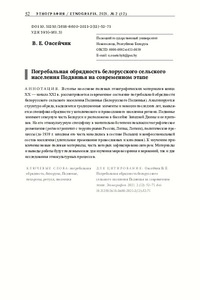Please use this identifier to cite or link to this item:
https://elib.psu.by/handle/123456789/28502Full metadata record
| DC Field | Value | Language |
|---|---|---|
| dc.contributor.author | Овсейчик, В. Е. | - |
| dc.contributor.author | Auseichyk, U. | - |
| dc.date.accessioned | 2022-01-04T07:11:14Z | - |
| dc.date.available | 2022-01-04T07:11:14Z | - |
| dc.date.issued | 2021 | - |
| dc.identifier.citation | Auseichyk, U. Funeral rites of the belarusian rural population of the dvina region at the present stage (2021) Etnografia, 2021 (2), pp. 52-71. | ru_RU |
| dc.identifier.uri | https://elib.psu.by/handle/123456789/28502 | - |
| dc.description.abstract | В статье на основе полевых этнографических материалов конца ХХ — начала ХХІ в. рассматривается современное состояние погребальной обрядности белорусского сельского населения Подвинья (Белорусского Подвинья). Анализируется структура обряда, выделяются традиционные элементы и новации последних лет, выявляется специфика обрядности у католического и православного населения региона. Подвинье занимает северную часть Беларуси и расположено в бассейне Западной Двины и ее притоков. На его этнокультурную специфику в значительной степени повлияли географическое размещение (регион граничит с территориями России, Литвы, Латвии), политические процессы (до 1939 г. западная его часть находилась в составе Польши) и конфессиональный состав населения (длительное проживание православных и католиков). К изучению привлечены новые полевые материалы, часть которых зафиксирована автором. Материалы и выводы работы будут полезными как для изучения мировоззрения и верований, так и для исследования этнокультурных процессов.= Based on field ethnographic materials from the late twentieth — early twenty first centuries, the article discusses the contemporary state of funeral rites among the Belarusian rural population of Dvina Region (Belarusian Podvin’e). The author analyzes the structure of the ritual, singles out traditional elements and recent innovations, and reveals the specificity of the rituality of the Catholic and Orthodox population of the region. Podvin’e occupies the northern part of Belarus and is located in the basin of the Western Dvina and its tributaries. Its ethno-cultural specificity in the region has been largely shaped by its geographical location (the region borders on the territories of Russia, Lithuania, and Latvia), political processes (until 1939 its western part was a part of Poland), and the confessional composition of the population (long-term residence of the Orthodox and Catholics). The study involves new field materials, some of which were recorded by the author. Materials and conclusions of the article can be useful for studies of worldviews and beliefs, and also those of ethno-cultural processes. | ru_RU |
| dc.language.iso | ru | ru_RU |
| dc.publisher | Peter the Great Museum of Anthropology and Ethnography (Kunstkamera), Russian Academy of Sciences | - |
| dc.subject | Погребальная обрядность | ru_RU |
| dc.subject | Белорусы | ru_RU |
| dc.subject | Подвинье | ru_RU |
| dc.subject | Похороны | ru_RU |
| dc.subject | Ритуал | ru_RU |
| dc.subject | Эволюция | ru_RU |
| dc.subject | Аuneral ritual | ru_RU |
| dc.subject | Belarusians | ru_RU |
| dc.subject | Dvina Region (Belarusian Podvin’e) | ru_RU |
| dc.subject | Ritual | ru_RU |
| dc.subject | Evolution | ru_RU |
| dc.title | Погребальная обрядность белорусского сельского населения Подвинья на современном этапе | ru_RU |
| dc.title.alternative | Funeral Rites of the Belarusian Rural Population of the Dvina Region at the Present Stage | ru_RU |
| dc.type | Article | ru_RU |
| dc.identifier.doi | 10.31250/2618-8600-2021-2(12)-52-71 | - |
| Appears in Collections: | Публикации в Scopus и Web of Science | |
Files in This Item:
| File | Description | Size | Format | |
|---|---|---|---|---|
| Auseichyk_2021.pdf | 394.99 kB | Adobe PDF |  View/Open |
Items in DSpace are protected by copyright, with all rights reserved, unless otherwise indicated.